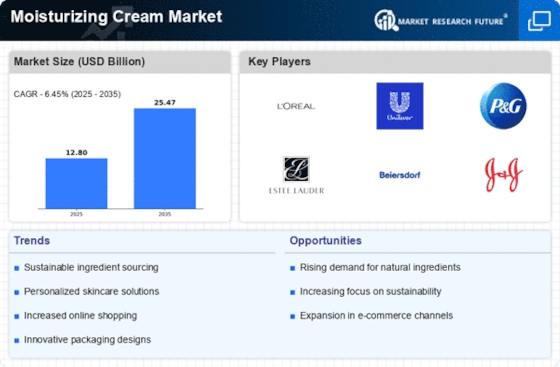Top Industry Leaders in the Moisturizing Cream Market

Market share analysis within the Moisturizing Cream industry involves crucial factors. Brand reputation, formulation efficacy, skin compatibility, pricing strategies, distribution networks, and marketing significantly impact market positioning. Brands excelling in providing high-quality moisturizing creams with proven efficacy, suitable for different skin concerns, and priced competitively secure a significant market share. Additionally, factors like positive customer reviews, dermatologist recommendations, and brand loyalty influence market share.
New and emerging companies in the Moisturizing Cream market often focus on specialized formulations, natural ingredients, or targeted skincare solutions. These emerging players leverage innovation in natural and organic ingredients, introduce specialized creams for specific skin concerns or age groups, and emphasize clean beauty to appeal to consumers seeking personalized and natural skincare options. Moreover, they rely on digital marketing, partnerships with beauty influencers, and direct-to-consumer models to gain visibility and compete with established brands.
Industry news in the Moisturizing Cream market revolves around skincare advancements, ingredient innovations, and consumer preferences. Brands invest in research to explore new skincare ingredients, improve formulations for better absorption and hydration, and align with the increasing demand for clean beauty. Additionally, there's an emphasis on educating consumers about the benefits of various skincare ingredients through marketing campaigns and initiatives promoting effective skincare routines.
Current investment trends within this market highlight a strong focus on research, innovation, and digital marketing strategies. Companies invest in R&D for advanced formulations, clinical studies for efficacy claims, and technological advancements for better delivery systems. Furthermore, investments in influencer collaborations, social media marketing campaigns, and enhancing online sales channels through e-commerce platforms are prevalent among industry players.
The overall competitive scenario within the Moisturizing Cream market remains dynamic and consumer-centric. Established players face competition from newer entrants focusing on innovation, natural ingredients, and personalized skincare solutions. Differentiation through product efficacy, formulation quality, targeted skincare solutions, pricing strategies, marketing initiatives, and alignment with evolving consumer preferences for effective, natural, and personalized skincare will determine a company's success and competitive standing in this rapidly evolving market landscape.
Industry News and Investment Landscape:
- Acquisitions that have recently occurred, such as Unilever's acquisition of Tatcha, demonstrate market consolidation patterns.
- A future-focused approach is indicated by increased investments in R&D, which concentrate on customized solutions, novel ingredients, and sustainable practices.
- Online beauty tutorials and influencer recommendations are becoming more and more popular, which increases consumer demand for particular products and ingredients.
Key Companies in The Moisturizing Cream Market Include
- Beiersdorf AG
- L'Oréal S.A.
- The Estée Lauder Companies Inc
- Company Shiseido
- Johnson & Johnson Services, Inc
- The Procter & Gamble Company
- The Face Shop Co.Ltd











